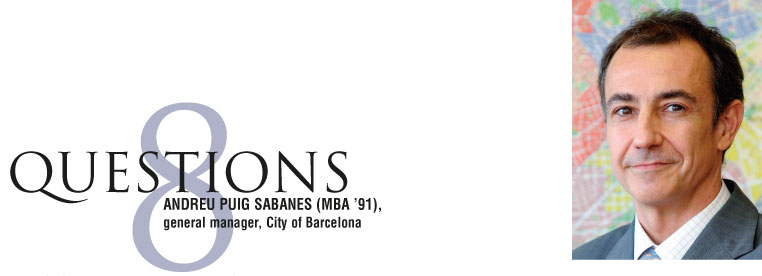|

The host city of NYU Stern’s Global Alumni Conference in 2009, metropolitan Barcelona is a glittering port city of 3.5 million people, a leading business, cultural, and tourist center, not just of Spain, but internationally. There is a mayor of Barcelona, who is elected, and behind him there is Andreu Puig, the executive who runs the city. Puig is responsible for managing Barcelona’s 2.6 billion euro budget, 13,000 employees, public services, and urban and economic development.
1. Two weeks after you started your job, in July 2007, there was a blackout in Barcelona that affected 260,000 people and lasted three days. What did you learn from that?
It was a quick lesson in getting to know the organization and how to get things done. I had to deal with federal, local, and state agencies and police, firemen, social assistance, and power companies. Fortunately, there were no murders, no looting, and fewer traffic incidents than on normal days. And after the crisis, we established a project that we call the three S’s: supply, security, and system. We may be the only city with a fully coordinated diagnostic capability for our infrastructure.
2. What were some of the lasting effects of the Olympics, which Barcelona hosted in 1992?
It was a great experience, and we were able to exploit that opportunity. We emerged from the number two city in Spain and the capital of Catalonia to become a major international city. Our goal has been to maintain and take advantage of that position. We have built on a very effective brand image, attracting tourism as well as investments. We are now one of the top cities for living and business.
3. What is driving the city’s growth now?
Barcelona has become the European capital of the Mediterranean. Last November, we were chosen by the European Union as the site of the European Agency for Mediterranean Cooperation, which includes North Africa. We have the second busiest harbor in Europe, and we are the southern gateway for Asian products to enter Europe. We are the city of reference for business development, culture, and architecture.
4. How would you like to see Barcelona evolve in the coming decades?
We want this to be the city with the most opportunities for its residents, with the quality of life here the same for everybody. We are working to ensure the same standards for transportation, infrastructure, services, public space, commerce, residential areas, and neighborhoods. A socially cohesive society is a sound base to boost economic growth. We have done this across our 10 districts and are now working on our 73 neighborhoods.
5. What is the greatest challenge you face in your job today?
We think what makes the city work is not just the city council but everyone who operates in the city – the businesses, the NGOs, the social service organizations, the civil societies – many more stakeholders than in the private sector. It takes public/private cooperation to develop a consensus and to forge a common vision as to where the city should go. In the spirit of the Olympics, a “Model Barcelona” project was initiated [an internationally renowned combination of urban policies], and advancing it is a top priority.
6. Barcelona is hosting Stern’s Global Alumni Conference in June, and you are on the host committee. What kind of impression are you hoping alumni will take away?
Three things: First, the local flavor of our Catalan culture – our language, our cuisine, and the sea. Second, our history, from Roman and medieval times to Gaudí. And third, the future: We are a place of tremendous business opportunity.
7. What could American businesses learn from Spain’s, and vice versa?
We can offer creativity and innovation, not only technical but process innovation, a way of seeing business within a culture. We think branding is one of our strong points – how to build brands with special tastes and values. From America, we can learn more on how to become global. We can also borrow a greater sense of urgency, as the world turns very quickly. Americans are very good at being flexible.
8. How did your Stern experience contribute to your success?
That experience is now more useful than ever, especially in the global environment, which is increasingly complex and turbulent. Stern helped me to understand how the different elements of society are interconnected, which is necessary to understand change. It also taught me values and social responsibility which are also very important.
|


![]()